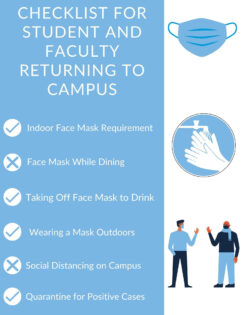After taking classes at home, students will have to transition back to a larger group setting on campus with guidelines that were not their pre-pandemic. Art by Jasmine Contreras
By: Jasmine Contreras, Staff Reporter
Despite reassurances of moving to 80 percent in-person classes in the spring, concerns over positive cases, social distancing, and mask mandates are part of the students worries.
Those concerns include whether students in a classroom will be notified if one student tests positive for the coronavirus. If social distancing will be a requirement inside classrooms and the overall campus; will mask-wearing be enforced, and the safety of the Loker Student Union’s food court with so many individuals close together.
In a statement from Nov. 8, President Thomas A. Parham said the university understands how the transition to 80 percent of in-person courses has left students feeling uneasy. However, Parham wants to reassure students that California State University, Dominguez Hills will be safe.
“As it has been throughout the pandemic, our guiding principles are the health and well-being of our community and the academic success of all CSUDH students,” Parham said.
Parham said he understands and shares the feeling of certain students who are struggling with going back to an in-person environment. But he believes this is the right thing to do to accommodate others who have been affected by remote learning.
“It is my strong belief, and that of senior administration, that it is in the best interests of the vast majority of our students to return to on-campus instruction,” Parham said.
However, some students still have questions over at least four situations that will be part of the next semester.
If a Student Tested Positive for COVID-19
If a student has a positive case, the COVID-19 response team would send a notice to the student to isolate themselves and notify the professor of the situation. The response team would ask the student to identify whom they have come in close contact with. They would then only notify the close contacts and not the whole classroom, explained a university representative to an email from the Bulletin.
“We do not tell the entire class unless either the positive case and/or the professor identify the whole class as being a close contact,” explained Amy Bentley-Smith, director of Communications and Marketing.
According to a memo released to professors on Nov. 12, if a student or faculty tested positive, they would need to contact the reporting hotline at 310-243-2076. This step is the same for those that are close contacts. In general, if someone has new symptoms in relation to COVID within 24 hours, they need to contact the reporting hotline.
“My parents are not as young as they used to be so if there is a chance I caught the illness, I would want to know so I can get tested,” English major Gabriela Tinoco said.
Tinoco said that if a classmate were to test positive, she would want herself and the rest of her class to be notified about the positive case. The University communications statement concerned Tinoco because she would want to take the next step to make sure if she is healthy or not.
Nicole Figueroa, a psychology major, also believes that students have the right to know someone got COVID-19 so they can get tested and ensure they are not spreading the virus. Figueroa said the statement has caused her to have a different perspective towards campus.
“Hearing their response made me a bit skeptical and I am now questioning the school’s ability to track those who test positive,” Figueroa said. “I think the university should approach this by putting the student’s and faculty’s health first.”
According to Smith, the response team would not tell the whole classroom of the case because “… the response team is following guidelines established by the CDC, Cal/Osha, and other health agencies regarding case investigations and contact tracing, which focuses on close contacts (within 6’ for a cumulative total of 15 minutes).”

Social Distancing in a Classroom
Social distancing is no longer a requirement on campus except when someone is not wearing a mask to eat or in the event of an outbreak. The university is taking necessary steps to prevent COVID from spreading, said university representatives.
“COVID-19 prevention is managed through vaccinations, testing, improved filtration in buildings, and good hygiene such as hand washing,” the university officials said.
Figueroa understood the reason why the campus is no longer requiring social distancing since they are following health official recommendations for those who are vaccinated. But she would feel safer if there was a possibility of desks being spaced out.
Figueroa said she thinks the university’s steps into making students feel safe are a good start, but these precautions need to be taken seriously by everyone.
“All in all though, these prevention methods are useless if not enforced and followed by those on campus,” Figueroa said.
As for Tinoco, she said it would be difficult to implement social distancing in a classroom due to most classrooms not being large.
“To keep desks six feet apart in every classroom would be preferred, but it is not likely,” Tinoco said.
Mask Wearing on Campus
According to the CDC, there is a low risk of the virus spreading in an outside setting, so fully vaccinated people do not need to use a face mask outdoors. But the CDC recommends fully vaccinated people to wear masks if there’s a requirement.
“Fully vaccinated people should also continue to wear a mask where required by federal, state, local, tribal, or territorial laws, rules, and regulations, including local business and workplace guidance,” the CDC said.
The university officials stated that CSUDH is following LA county guidelines where everyone is required to wear face coverings indoors, even if they are vaccinated. To help further protect the campus more, the university officials said the campus is requiring face masks to be worn on campus outdoors. Also, professors have the option to request face coverings through Facilities Services so they can distribute them to students.
Karen Garcia, a student at CSUDH, said she appreciated the access to masks students will have on campus if there was a situation where she would forget hers. She recognized the importance of enforcing wearing a mask indoors and outdoors on campus.
“Mandatory face coverings make me feel comfortable returning in person,” Garcia said.
In the case of a student refusing the face covering mandate during class, faculty may ask the student to leave or temporarily end class if the faculty is not comfortable addressing the violation. The student would need to be reported to the Office of Community Standards, the memo explained.
“The non-complying student will not be permitted to attend class until they comply with the face covering policy,” the memo said. “They also may be disenrolled from the course, depending on the severity of the issue.”
Students or faculty may return to campus in 10 days after they are tested positive. However, they must quarantine themselves if their fever remains at 100.4 or greater, explained the memo.
On-Campus Dining
Tinoco said she is worried about how the LSU will be a safe environment for students, staff, faculty, and employees.
“The food court is always crowded with long lines so what exactly is CSUDH going to do to make it safe? I think everyone should try to find a spot that is a little secluded to have their lunch or breaks,” Tinoco said.
Along with this, Figueroa is concerned about how students will handle transitioning back to campus. She said it can be stressful and students can face challenges.
“I hope the university and faculty will provide those students with support, understanding, and empathy,” Figueroa said.

